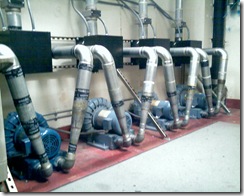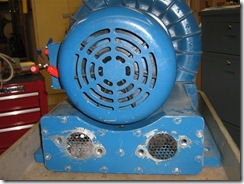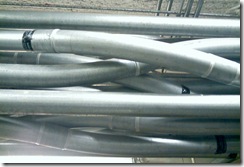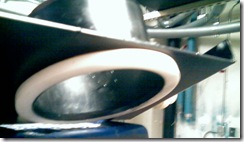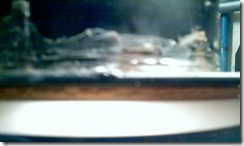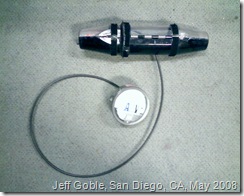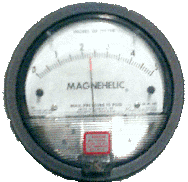
The service for Willo May was yesterday. I waited until today to write about her because I needed to. I wanted to reverberate the thoughts of her family, friends, and co-workers with my own, in an effort to be not quite so selfish in my thinking about her. For you see, it's one of the words that describes Willo May. Unselfish.
Willo May was, as her son said, part of "The Greatest Generation." She was a professor of music - piano, organ, theory - for some 39 years. She taught piano to thousands of people, including me. She began playing piano, then organ, in church services at the age of 12, nearly every Sunday, until 17 days before her death - a span of 79 years. She was one of those individuals who befriended nearly everyone, cooked for nearly everyone, taught us all much more than just music, and prayed and cared for everyone. She has played piano and organ for multiple generations of families' weddings (yes, mine and my parents') and funerals - she's accompanied thousands of rehearsals, recitals, choirs. . . A life of service.
She has always been a part of my consciousness, my wider family circle. As a young boy, we would travel to Aunt Willo May's for Thanksgiving and New Year's Day - they lived in Pasadena, and, back then, on New Year's Day, the floats from the Rose Parade would be parked about three blocks from their home, where we could see them up close. I know that it was more about the food and the fellowship, though, than flowers. In my memory, I have been remembering the sights and smells of that house, these past weeks. Her husband, Dan, was a football fan of epic proportions, particularly college football. His enthusiasm was infectious, and I found myself following players just to try and impress Uncle Dan, or at least keep up, when we were there. Thanksgiving usually included at least one guest from the college, or a serviceman from church - their hospitality nearly always extended outward to someone not home for the holidays. To put it bluntly, they set standards for us all, not by display, but by practice, of how to serve and love each other.
Then there were the piano lessons. Learning to play the piano, unfortunately, became the skirmish line in the battle between my Mother and I for control. I hated it. I was learning to play the cello, then the bass, rock and roll was in full swing, all I saw were guitars and basses - and I really didn't want to be a church pianist at all. It is a testament to both of them that they persevered with me as long as they did, and I did learn many valuable things about theory and life and love from Willo May. You see, we lived in Long Beach, about 30 -40 miles apart. Mom used to drive me, every other weekend, for at least two years, to Willo May's for piano lessons. I have a musical gift that is in fact a two-headed monster - I have a real 'ear' for music. It makes it easy for casual music, to learn by listening. It doesn't work so well for the orchestra or, let's say, playing the piano, where you're really supposed to play the notes exactly as written. Most piano teachers, when giving me new music, would play the piece for me as an example. I would then go home and, when not stubbornly not practicing, I would learn to play the song from memory, not disciplining myself to translate the notation. Willo May figured this out, and started handing me music to learn sans demonstration. It was tough love. What small skills I now possess in the realm of reading music are attributable to her - as much for the realization that there was more to be gained by this than by not learning it, that discipline brought long-term rewards over short term satisfaction. She set a new standard for me. I didn't meet it, and I don't think it was too long after that that Mom surrendered to the battle of wills. Over the years, I had a few opportunities to play alongside her, as a bass player, and she was always very complimentary. She didn't know it, but I cherished those times, as I did her approval. I know that she wasn't pleased that I hadn't pursued the piano, but she never spoke a word to me to that effect. Willo May was a self-determined accompanist, and I understood this, and have shared and tried to emulate that aspect in my own playing.
I'd always felt that Willo May 'got' me, that she knew me pretty well, and loved me in spite of all that. I came to the realization, many years ago, however, that that was the way just about everyone else felt about her. The loss of that feeling of exclusivity, eventually, made me just love her more. Whether this trait was a gift, or the result of great effort, I do not know, but she applied it generously.
She died from what turned out to be a rapidly growing brain tumor. The diagnosis was that she'd have 3-4 months to live. I lazily assumed that she'd be around, this next weekend, for Emma's birthday party. I didn't speak with her. Fortunately, a large number of those that she'd 'gotten' did. She teaches, again, by example. Don't hesitate to tell those you love that you love them.
Yesterday was beautiful. I cried, not from sorrow, but from gratitude. Many people never know someone like Willo May. Others are influenced. I was privileged to gain part of her heritage; to claim her as my own, if only in small part. The outpouring of music, most of it selected by her, was testament to both her talent and heart for her savior. Her legacy is substantial, albeit mostly played out in churches around the world on Sunday mornings, not in great concert halls.
A life lived with excellence, through service to others. It is the life that Christ calls us all to.
Well Done, Aunt Willo May. Thank you. Thank you.



